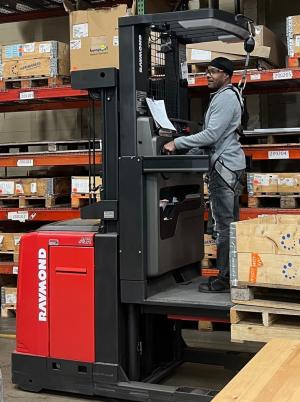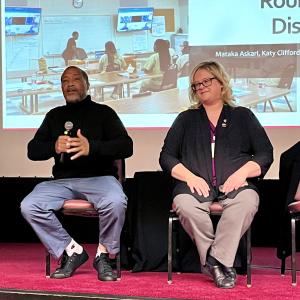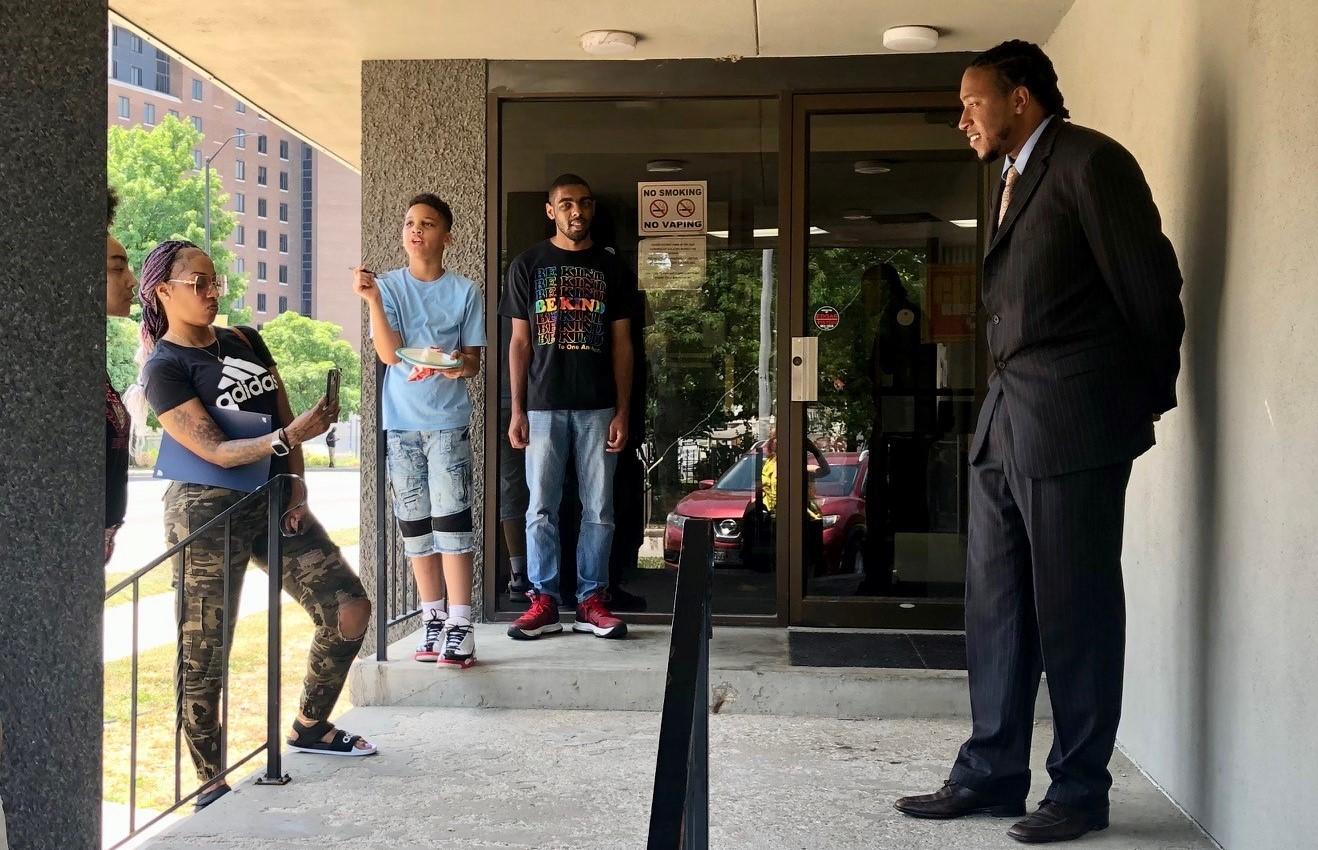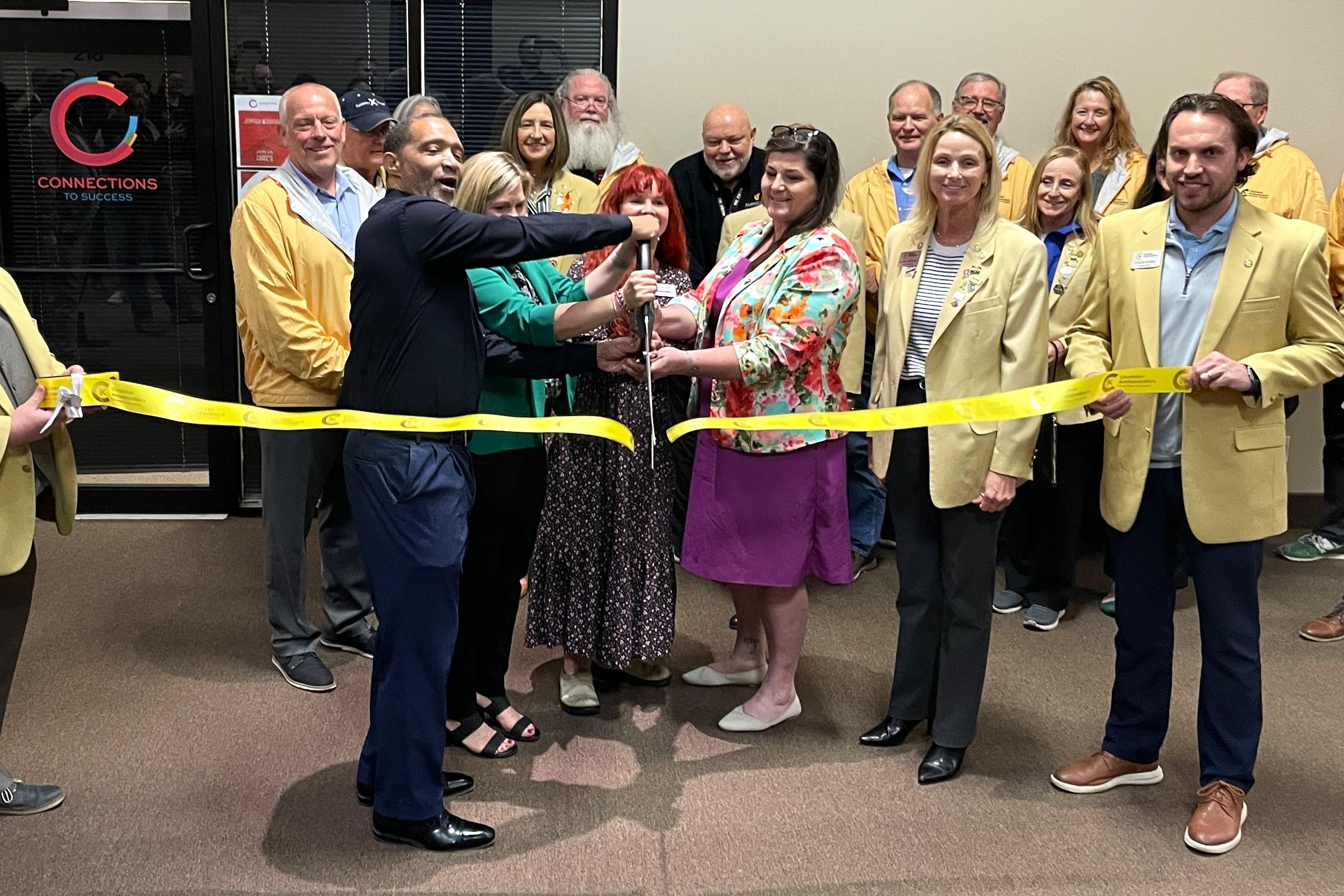Connections to Success and the Missouri Department of Corrections are partnering to prepare soon-to-be-released Missourians for fulfilling new jobs and new lives after prison
Story by Marcus Wilkins

As Tyrone Harris expertly maneuvers his forklift across the gray warehouse floor at Systemair — his full-time employer in Lenexa, Kansas — he appreciates, on a personal level, the functions of the machine.
It supports. It elevates. It facilitates the delivery of parts in service to a greater whole and a productive, gleaming future.
Harris, who served 16 years in the Missouri Department of Corrections (MODOC) for robbery, exudes gratitude for his newfound career and lifepath. Thanks in part to a grant-funded Connections to Success (CtS) program, through which the nonprofit is teaming with MODOC to prepare residents for post-incarceration life, Harris got off to a flying start upon his release in March 2024.
“During my time inside, I hadn’t really learned the technological aspects of modern-day living,” said Harris, who added that his problems stemmed mostly from alcohol and drug use. “Connections helped with basic computer skills, applying for jobs online, writing a résumé and doing mock interviews. It prepared me for the workforce.
“Now I have a 401K, life, health and dental insurance — and my forklift certification.”
Like Harris’s vocational vehicle, CtS and the MODOC are lifting people toward reentry prosperity. The program provides Missourians soon to be released with a 10-day, 60-hour intensive life-skills course covering 13 areas, including personal and career goal development, employment, job training, housing, transportation, health, spirituality, parenting/co-parenting and domestic violence. CtS also provides each participant with a new business suit (or other appropriate attire) to wear for interviews.
When Harris isn’t working, he lives with 17 roommates in Kansas City’s Oxford House — a shared residence for people in recovery. He is also active at Grace Baptist Church, where he mows the lawn, puts up holiday decorations and helps wherever needed.
Harris credits CtS for his perseverance after he was laid off from his first job months after his prison release.
“I didn’t let [the layoff] discourage me because I kept thinking about my teachings with CtS,” Harris said. “It’s an amazing program if you follow through with it. You have to be patient and find that good fit, and I found that. I love this job.”
Job Titles

Mataka Askari, aka Michael Eanes, has had many names throughout his lifetime.
Son, who at age 10 in St. Louis turned to crime to help provide for his family. Felon, who served 22 years for a nonviolent drug offense before his 2018 release. Bibliophile, whose reading appetite while incarcerated changed his outlook on life. DOC reentry board member, motivational speaker, CtS instructor … the list goes on.
Yet there’s one title that carries more weight than all others combined.
“Whatever life bestows upon me, the greatest label I wear is Dad,” said Askari, father to five-year-old daughter, Xola. “Every day [during CtS class] I ask students for three affirmations. Something like: I am powerful, I am kind, I’m a great dad, I’m supportive, I’m loving. We encourage [participants] to step outside of the box and find new ones every day.”
Askari is also a graduate of CtS, so he acutely appreciates the program’s value. After his release, Askari obtained two credentials from the Missouri Credentialing Board: peer specialist and batterer-intervention specialist. His résumé — which, fittingly, CtS helped him polish — made him a perfect fit for the organization.
“[Outside] people try to hire me away every day,” Askari said with a laugh. “But I’m not leaving Connections. I’m a communicator, a relationship builder and I love this work.”
Each day of the 10-day CtS Personal and Professional Development Training begins with gratitude circle, a concept central to the program. Each participant also leaves the program with tangible assets including an individually crafted résumé and cover letter; a personality profile with an understanding of how to maximize their style and strengths; a 30-second "commercial" about themselves and their employment goals; and the all-important new outfit.
“I think that’s my favorite part about what we do,” said Helen Hurley, CtS regional program director. “Don’t get me wrong; I love it all. But to see the look on someone’s face — someone who might have never worn a suit — when they see how good they look, it’s a whole different perspective and level of confidence for them.”
The roots of CtS can be traced to its original iteration, a St. Louis affiliate of the national organization Dress for Success, which CtS cofounder Kathy Lambert launched in 1998 to help women get the professional business attire they need. A year later, with her husband Brad, Lambert launched a Midwest affiliate of Wheels for Success, which helps provide transportation for people with barriers to employment.
By 2001, the various services merged as Connections to Success, a holistic nonprofit helping people find financial independence. With many formerly incarcerated people among the clientele, CtS launched a grant-funded pre-release program in Missouri state prisons, with the first class graduating in 2018.
The newest version of that program, which kicked off at Western Reception, Diagnostic & Correctional Center (WERDCC) and Tipton Correctional Center (TCC) before expanding to other facilities, has produced 135 graduates to date — some of whom have gone on to education and occupational training including commercial drivers licensing, construction and barbering.
For Katy Clifford — institutional reentry coordinator at TCC, 17-year MODOC employee and CtS facilitator — caring creates connections.
“When participants realize somebody believes in their potential, and then they believe in themselves, those are the first steps,” Clifford said. “Seeing that change in their self-esteem and their beliefs about themselves is probably the most rewarding to see.”
Looking the Part

At first glance, the transformation is subtle.
Having completed the Professional Development Training, each CtS graduate twirls for before-and-after portraits — first in casual clothes, then in sharply tailored suits. The smiling “before” faces might seem more relieved than joyful. The “after” faces, however, beam with confidence and pride toward an unknown but optimistic future.
“On the count of three,” said Ivan Hubbard, a job developer and education specialist, leading the class in a celebratory cheer. “Strongly connected! WOO!”
As the CtS alumni embark on their next journey, some of the lessons — such as how to answer the interview question “Have you ever been convicted of a felony?” — will be directly applicable.
“Here’s the answer,” said Askari, modeling his personal experience. “Yes. In 1995, I received a sentence for illegal distribution and manufacturing of controlled substances. I’m not proud of what I’ve done, and I take full accountability.
“However, since then, I’ve completed several classes, including a personal and professional development class, critical thinking class, and I’ve developed a life plan with goals and an accountability network to help me reach those goals.”
Other lessons might be less concrete but infinitely valuable, such as the tools to build personal strength or simply maintaining a sense of gratitude. And as CtS alumni rejoin the world outside, many will remain connected to the organization through life coaches or mentors.
For Harris, many of his goals are still in front of him — such as buying a car and finding his own apartment. Although it will be the first time he will have lived on his own, he plans to stay connected.
“I’ll just keep putting one foot in front of the other,” said Harris, who celebrated the one-year anniversary of his release date on March 29. “I tell people don’t be afraid. Keep doing the work and you’ll be successful.”
Path Unlocked

Connections to Success (CtS) — the nonprofit organization partnering with the Missouri Department of Corrections (MODOC) to prepare soon-to-be-released incarcerated people with job interview training and skills for life outside of prison — celebrated a ribbon cutting for its offices at 601 Business Loop in Columbia, Missouri.
CtS leadership, members of the Columbia Chamber of Commerce, representatives from Burrell Behavioral Health and other partnering institutions attended the ceremonial event for the brick-and-mortar facility where the CtS staff has been operating for over a year.
“We’ve been doing the work quietly here in Columbia for five years, and in this space for the past year, with continued interest from the community,” said CtS CEO Brandi Jahnke. “So, now we wanted to let the community know that we’re here. Our services are available, but then also to get the community engaged with what we’re doing.”
CtS — which also has locations in Kansas City and St. Louis — provides mentoring, job training and support services to help individuals break the cycle of poverty and achieve economic independence. Several proud CtS alumni — formerly incarcerated men who have found success since their release — were on hand to promote the program, including Mataka Askari.
“I’ve been working for Connections to Success for five years, and that’s the longest job I ever had in my life,” said Askari, CtS training facilitator. “Only thing I did more than five years was prison time. But they taught me early on how to answer that felony question and address that work-history gap in your résumé.”
As attendees enjoyed refreshments and mingled, Jahnke also sang the praises of CtS’s partnership with MODOC.
“We began working with returning citizens well over 20 years ago and with the Missouri Department of Corrections in different ways through the years, and it has been amazing,” Jahnke said. “The collaboration, the pre-release work, especially helps individuals because they’re able to do the training, get connected and they have a link. They know who to talk to when they get home.”
